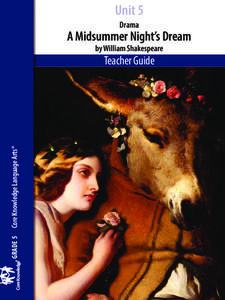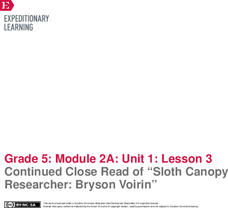Core Knowledge Foundation
Unit 8: Native Americans
Over five weeks, fifth graders listen to and discuss reading passages that explore the connection between Native Americans and nature. Following daily readings, scholars practice word work, including prefixes, root words, suffixes,...
Core Knowledge Foundation
Unit 7: Poetry
Over the course of a 12-lesson language arts unit, young scholars analyze a variety of poems taking a close look at figurative language and tone. They learn to compare and contrast, improve comprehension, and identify settings. To...
Core Knowledge Foundation
Unit 6: The Reformation
Over three weeks, fifth graders read about and discuss the Reformation which saw religion and politics shift across Europe. Following daily readings, young scholars practice spelling, grammar, and morphology skills such as prefixes,...
Core Knowledge Foundation
Unit 5: A Midsummer Night’s Dream
Fifth graders analyze William Shakespeare's A Midsummer Night's Dream, paying close attention to character development, plot, and dialogue. With daily reading and thoughtful discussion, scholars take pen to paper to respond to journal...
Core Knowledge Foundation
Unit 4: The Renaissance
The Renaissance is the theme of a five-week unit designed to boost reading comprehension, spelling, vocabulary, and expository writing skills. Scholars listen to and discuss daily readings and engage in skills practice activities...
Core Knowledge Foundation
Unit 3: Adventures of Don Quixote
Fifth graders explore the Adventures of Don Quixote in a four-week language arts unit. Scholars listen to and discuss a new chapter each day as well as examine vocabulary and practice word work including suffixes, subject-verb agreement,...
Core Knowledge Foundation
Unit 2: Early American Civilizations
Fifth graders explore early American civilizations in a four-week ELA unit. Every lesson offers an opportunity to read and discuss a selected passage followed by word work that covers vocabulary, grammar, and morphology. Learners write...
ReadWriteThink
Literature Circles: Getting Started
Make reading more enjoyable and interactive with literature circles! Here you'll find detailed lessons to begin the literature circle process. Ten lessons introduce each role learners take on. Literature circle roles include...
Common Sense Media
Talking Safely Online
What is the difference between online and real-life friendships? Pupils learn how to keep information private online and maintain their safety in various situations requiring online communication.
Common Sense Media
Digital Citizenship Pledge
Learners collaborate to create a set of group norms and expectations by which they will abide in order to promote a safe, respectful online community.
Scholastic
Reading Skills Profile
Assess your young learners' reading skills, from sounding out words to general comprehension and identifying facts vs. opinions, with this excellent worksheet. The resource also includes a goal-setting worksheet that focuses...
EngageNY
Reading for Fluency: Readers Theater about the Rainforest (Page 33)
Lights, camera, action. Scholars use page 33 of The Most Beautiful
Roof in the World to create a readers theater. They work in triads and use sticky notes to mark and create their own speaking parts from sections of the text. They then...
EngageNY
Continued Close Read of “Sloth Canopy Researcher: Bryson Voirin”
Let's explore the rainforest by studying its inhabitants. Pupils continue reading an interview with a sloth scientist and answer text-dependent questions. Next, they engage in a class discussion to share the new facts they learned about...
Arcademics
Penguin Hop
It's a race to learn the state capitals. Using a multi-player video game, participants hop from iceberg to iceberg as penguins in response to questions about state capitals. The real-time practice lets both teacher and learner assess...
Arcademics
Country Toad
Hop from country to country to practice knowledge of international capitals using an interactive video game. Pupils take control of frog avatars and direct them to leap from the name of a capital to its home country. The video game...
Arcademics
Toad Hop
Hop-scotch your way across the world to help improve class members' skill and accuracy in identifying capital cities. By using a frog avatar, learners leap to the correct country for each capital city as it flashes up on the screen....
Arcademics
Capital Penguin
Hop across the country like a penguin from ice floe to ice floe using an interactive video game. Acting as a penguin, learners match capitals to their states. Game features allow teachers to set up competitions and check learning progress.
Purdue University
Food Waste Solutions
Easy doesn't always mean better. In an era with pre-packaged everything, learners consider the environmental impact of the convenient trend. They critique the packaging of food and how waste impacts cost and then look for solutions.
Purdue University
Food Waste and the Environment
Out of sight out of mind can be a dangerous habit. Learners investigate the life of food waste after it leaves people's homes and its impact on the environment. They complete a series of three activities that involve building a mini...
Purdue University
Trees of the Midwest
All trees are not created equal. A set of three wildlife conservation lessons has learners examine the characteristics of individual trees. They look at the life cycle of the tree using a story and reference a field guide to identify...
Bully Free Systems
Bully Free Lesson Plans—Fifth Grade
Two lessons take a look at bullying. Lesson one focuses on physical bullying. Scholars identify the bullying type's qualities, read short stories and answer comprehension questions. Lesson two offers advise on what to do as a bystander...
Florida Center for Reading Research
Comprehension: Text Analysis, Fiction and Nonfiction Find
Scholars analyze fiction and nonfiction text and fill in a worksheet detailing the text's title, genre, and reason for its classification.
Florida Center for Reading Research
Fluency: Connected Text, Practice and Read
A reading activity boosts scholars' level of fluency while reading connected text. Working collaboratively, pairs read a word list three times and a specific text while their partner gauges their accuracy and speed.
Florida Center for Reading Research
Fluency: Chunked Text, Reading Chunks
The activity focuses on reading chunked text. Peers grouped by specific ability levels take turns reading a text with proper intonation, expression, and phrasing.

























